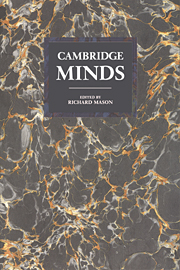Book contents
- Frontmatter
- Contents
- Notes on contributors
- Preface
- 1 The effects of a broken home: Bertrand Russell and Cambridge
- 2 I. A. Richards, F. R. Leavis and Cambridge English
- 3 Emily Davies, the Sidgwicks and the education of women in Cambridge
- 4 Radioastronomy in Cambridge
- 5 Three Cambridge prehistorians
- 6 John Maynard Keynes
- 7 Mathematics in Cambridge and beyond
- 8 James Stuart: engineering, philanthropy and radical politics
- 9 The Darwins in Cambridge
- 10 How the Burgess Shale came to Cambridge; and what happened
- 11 Ludwig Wittgenstein
- 12 ‘Brains in their fingertips’: physics at the Cavendish Laboratory 1880–1940
- 13 J. N. Figgis and the history of political thought in Cambridge
- 14 Molecular biology in Cambridge
- 15 James Frazer and Cambridge anthropology
- 16 Michael Oakeshott
8 - James Stuart: engineering, philanthropy and radical politics
Published online by Cambridge University Press: 21 October 2009
- Frontmatter
- Contents
- Notes on contributors
- Preface
- 1 The effects of a broken home: Bertrand Russell and Cambridge
- 2 I. A. Richards, F. R. Leavis and Cambridge English
- 3 Emily Davies, the Sidgwicks and the education of women in Cambridge
- 4 Radioastronomy in Cambridge
- 5 Three Cambridge prehistorians
- 6 John Maynard Keynes
- 7 Mathematics in Cambridge and beyond
- 8 James Stuart: engineering, philanthropy and radical politics
- 9 The Darwins in Cambridge
- 10 How the Burgess Shale came to Cambridge; and what happened
- 11 Ludwig Wittgenstein
- 12 ‘Brains in their fingertips’: physics at the Cavendish Laboratory 1880–1940
- 13 J. N. Figgis and the history of political thought in Cambridge
- 14 Molecular biology in Cambridge
- 15 James Frazer and Cambridge anthropology
- 16 Michael Oakeshott
Summary
Professor James Stuart is possibly the least remembered of this collection of ‘Cambridge minds’. What, then, are his claims for inclusion in the company of say, the Darwins, Keynes or Wittgenstein? My subtitle offers a clue. His was an unusually wide range of interests, and in Stuart we see the academic venturing into the public sphere, ultimately at the cost of his reputation in Cambridge.
Stuart played a significant part in the movement for university reform in the mid-nineteenth century. He was anxious to extend the work of the University beyond Cambridge – to today's adult education, to provide opportunities for women's higher education, and to develop engineering as a proper subject for undergraduate study. But for Stuart reform went beyond the confines of the University. He was involved in one of the great moral reform movements of the period, the campaign to repeal the Contagious Diseases Act, Britain's only foray into the controversial area of regulated prostitution. He was later a Liberal MP on the radical wing of the party, he ran a major London newspaper, was a devoted member of the London County Council, and ended his career as an industrialist, managing the country's most celebrated mustard works.
Even this summary glosses over aspects of a career which reveals a spread of commitment far wider than would be found today.
- Type
- Chapter
- Information
- Cambridge Minds , pp. 100 - 109Publisher: Cambridge University PressPrint publication year: 1994

